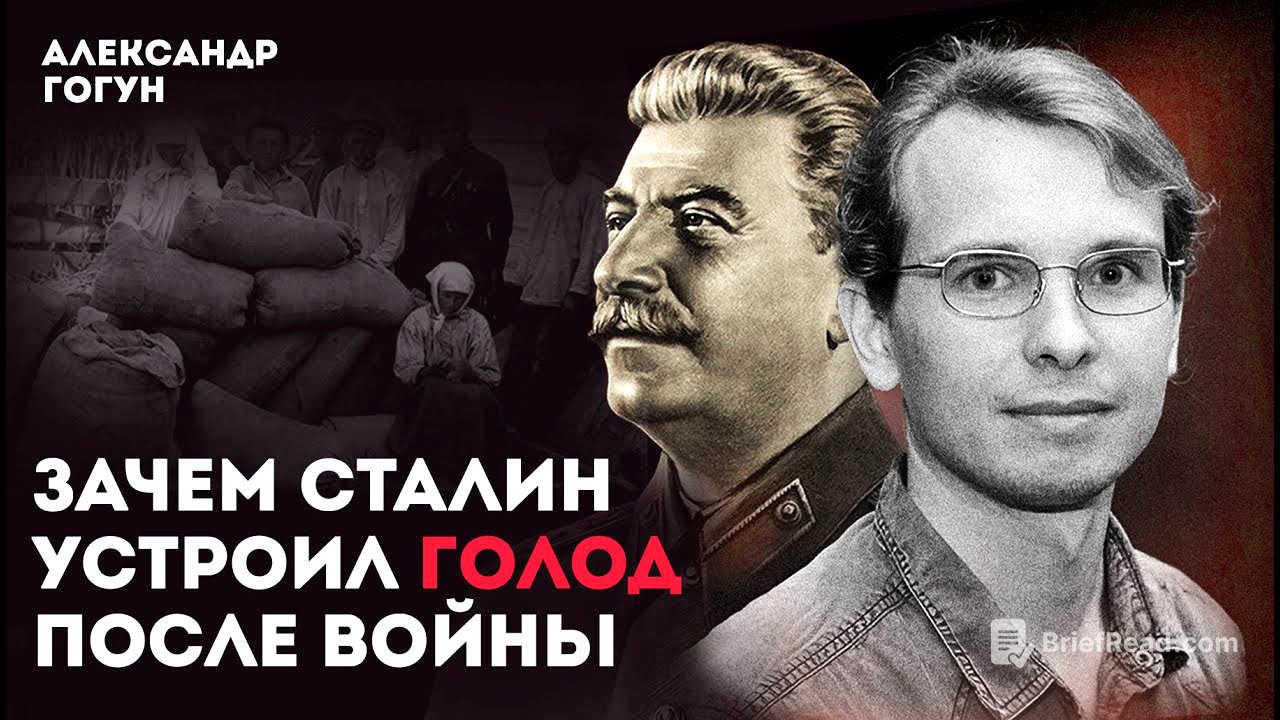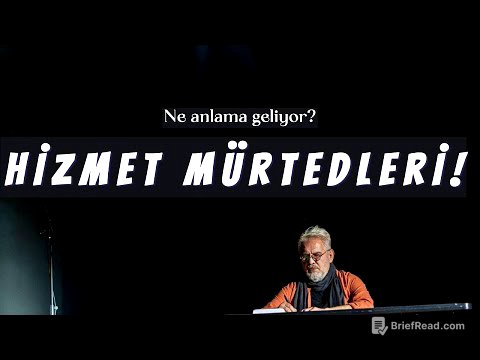TLDR;
This video features a discussion with historian Alexander Gun, focusing on Stalin's preparations for a potential Third World War, the misconceptions about Stalin in the West, and the geopolitical strategies of the Soviet Union. It also touches on the comparison between Stalin and Putin, the vulnerability of the "axis of evil," and the instrumental use of genocide narratives in Belarus.
- Stalin's preparation for Third World War and misconceptions in the West.
- Geopolitical strategies of the Soviet Union.
- Comparison between Stalin and Putin.
- Instrumental use of genocide narratives in Belarus.
Приветствие [0:00]
The host introduces historian Alexander Gun, a Berlin-based expert originally from St. Petersburg. The discussion aims to explore Gun's research on Stalin's preparations for a potential Third World War, a topic the host finds particularly relevant given current geopolitical tensions. The host expresses admiration for Gun's work and notes the challenge Gun faces in securing funding for his research and book publications.
Почему историки сами ищут деньги на свои книги? [1:53]
Alexander Gun explains the difficulties in finding financial support for his research. He mentions two attempts by the Kremlin to co-opt his work, which he declined due to the potential for manipulation. He also notes that the Western academic world, while not monolithic, is plagued by incompetence, unfair competition, and lobbying, including pro-Kremlin interests. Gun resorts to crowdfunding to finance his research, highlighting the importance of historical truth in the face of lies and incompetence.
Коррупция в западном академическом сообществе [4:18]
The conversation shifts to the Western academic community's perception of Stalin and the Soviet Union. Gun points out that despite the revelations of secret protocols and documents exposing Stalin's aggressive intentions, a version of the Soviet Union as peaceful and non-aggressive persists. This view is not limited to Kremlin circles but is also found in Europe and North America, where researchers often hold onto stereotypes about the Soviet Union and Putin's Russia.
Заблуждения по поводу Сталина на Западе [5:40]
Gun identifies three main stereotypes that contribute to misconceptions about Stalin in the West. The first is egocentrism, where Western researchers project their own market-economy and democratic values onto Stalin, attributing to him motivations similar to those of Western leaders. The second stereotype is the perception of the Soviet Union as a passive entity, reacting to Western initiatives rather than initiating its own. The third stereotype is the belief that the Soviet Union was too weak to attack the "mighty, rich, and intelligent" West.
Почему Виктора Суворова до сих пор считают маргиналом? [11:52]
Gun discusses why Viktor Suvorov's revisionist history of World War II is still considered marginal in the West. He attributes this to the way Suvorov's work was initially presented and formatted, which did not resonate with the Western academic world. Gun hopes that his own book on Stalin's preparations for the Third World War will be formatted in a way that is more accessible and persuasive to Western audiences.
Как Сталин готовил третью мировую войну [15:12]
Gun explains how he became interested in the topic of Stalin's preparations for a Third World War. He notes that while the foreign policy aggressiveness of the Soviet Union is underestimated, Stalin persistently repeated mistakes after the Second World War, similar to those during the First Five-Year Plan. This led him to believe that Stalin was preparing for a third world war, a fact that is not widely known, especially in Russia.
Причины послевоенного голода в СССР [17:15]
Gun argues that the post-war famine in the USSR was not solely a consequence of the war but also a result of Stalin's policies, particularly grain procurements. He cites studies showing that the famine was artificial, with Stalin taking grain from the peasants despite the existence of strategic grain reserves. This policy faced resistance within Stalin's inner circle, but he persisted in collecting resources for a potential third world war.
Почему третьей мировой не случилось [20:00]
Gun contrasts Stalin's systematic preparation for a head-on collision with NATO with Khrushchev's efforts to avoid it. Khrushchev, for various reasons, sought to avoid a direct confrontation, especially with the advent of the Rocket Age, which made nuclear war meaningless. Global expansion under Khrushchev and Brezhnev was carried out differently than under Stalin, focusing on advancing in the Third World rather than a direct strike against the United States.
Как Сталин привёл к власти Мао [22:20]
Gun details Stalin's actions in the years leading up to the Third World War, including his support for Mao Zedong in China. Stalin's distracting actions, such as the invasion of Manchuria and support for Ho Chi Minh in Vietnam, were aimed at diverting the United States and its allies from the civil war in China. This support, including the transfer of captured Japanese weapons, helped Mao come to power.
Почему Сталин спешил [25:20]
Stalin's urgency in preparing for war stemmed from his belief that the Soviet Union had a 3-4 year window of superiority over capitalism. He aimed to use this time to create strong armies, with a potential war starting in 1953 or 1954. American estimates from the same period coincide with this timeline, indicating a critical period of 2-3 years.
– Кем были Чкалов и Челюскинцы? [26:54]
Gun discusses Stalin's systematic advance to the North Pole, starting in the 1930s, as part of preparations for a potential invasion of America through the Arctic. This included reconnaissance and the development of aviation units capable of sending hundreds of aircraft to the Arctic. He also mentions the "king torpedo," a massive thermonuclear missile designed to create tsunamis and destroy major U.S. coastal cities.
– Многоходовочки Сталина [33:58]
Gun addresses the question of whether Stalin overestimated his foresight. While actions like establishing control over China were significant victories, they also led to the creation of NATO and alliances against the Soviet Union. Gun argues that Stalin always saw the U.S. as the main enemy and understood the need to acquire comparable resources to crush it.
– Сталин недооценил ядерное оружие [40:21]
Gun discusses the theory that Stalin underestimated nuclear weapons and was removed from power due to fears of being drawn into a nuclear war. Gun argues that Stalin publicly downplayed the significance of nuclear weapons to reassure people, while privately understanding their power. He notes that Soviet military experts calculated that the impact of an atomic bomb in a front-line operation would be limited.
– Путин – преемник Сталина? [45:20]
Gun draws parallels between Stalin and Putin, noting their shared cynicism. He suggests that Putin, like Stalin, may be playing a mask to intimidate and deter. However, he emphasizes that Putin's goals are different from Stalin's, focusing on maintaining power and stealing petrodollars rather than global conquest. Gun predicts that there will be no third world war, as Putin's Russia lacks the strength to initiate one.
– Уязвимость оси зла [48:27]
Gun identifies the "axis of evil" as a group of countries, including Cuba, Syria, Iran, Russia, China, North Korea, and Taliban Afghanistan, that pose a constant threat to Western Europe and the USA. He argues that the strongest and most powerful member of this alliance is China, and that a revolution in China would likely lead to the collapse of the entire axis.
– Коммандос Сталина [59:30]
Gun discusses his book "Stalin's Commando" and the events in Bucha, Ukraine, as examples of terror tactics aimed at intimidating the enemy and provoking a response. He notes that such tactics, while bloody, often fail to achieve their intended goals.
– Роль Сталина в Волынской резне [1:03:23]
Gun explores the role of Soviet partisans in the Volyn massacre, arguing that they deliberately provoked tensions between Poles and Ukrainians. He explains that the Soviet side exploited existing animosities and used the conflict to their advantage, even though there was no deliberate order to instigate the massacre.
– Советские партизаны в Беларуси [1:09:29]
Gun compares Ukrainian and Belarusian Soviet partisans, noting that terrible things happened in Belarusian partisan detachments. He explains that in eastern Belarus, actions such as burning police villages were carried out, which did not occur in central-eastern Ukraine. He also notes that Belarusian partisans were more passive and focused on blowing up rails, while Ukrainian partisans were more active in conducting raids.
– Зачем Лукашенко говорит о геноциде? [1:16:13]
Gun discusses the promotion of the narrative of genocide in Belarus during the Second World War, with Belarusian patriots being blamed. He suggests that this is a mechanical replacement of the trip due to the lack of their own ideological trip and instrumentalism in the future. He also notes that dictatorships often use the word genocide to justify their actions and potentially involve Belarusians directly in the war.









